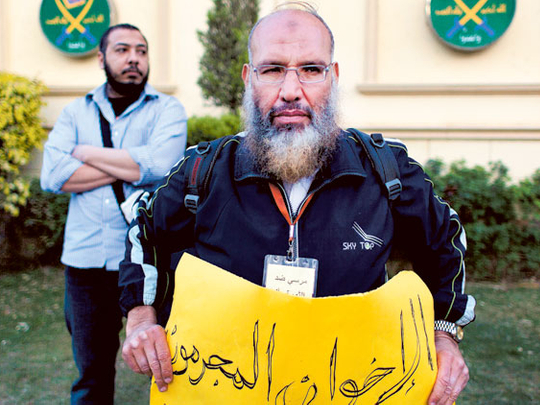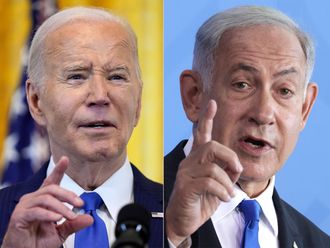
Cairo: Egypt’s State Commissioners Board (SCB) recommended Wednesday that the Muslim Brotherhood be dissolved due to its shaky legal status.
The Islamist group rebuffed the recommendation and its lawyer considered SCB report as “inopportune.”
The SCB urged Supreme Administrative Court (SAC) to reject the longstanding appeal by the Muslim Brotherhood to revoke the 1954 decision made by the late President Nasser’s Revolutionary Command Council (RCC) declaring the group illegal and ordering its dismantling.
The SAC is considering a legal case against the Muslim Brotherhood, which was founded in 1928, demanding its dissolution, based on the argument that the organisation has no legal status. The verdict will be delivered on March 26.
The board went on to say that appeal requests filed by members of the Brotherhood are considered legally null, as the group never had a legal identity.
The lawsuit was originally filed by the late Omar Al Telmesny, the Brotherhood’s former supreme guide. He claimed the Revolutionary Command Council resolution issued in 1954 to dissolve the Muslim Brotherhood was unjust and that the group’s confiscated funds should be given back.
The case was passed to Mohammad Hamed Abu Al Nasr, also a former Brotherhood supreme guide, and leading member Tawfiq Al Shawi, who challenged the decision in a case before the Supreme Administrative Court. However, both men also died before any ruling was made.
The Muslim Brotherhood was outlawed as part of a series of wide-ranging crackdowns by the Jamal Abdul Nasser regime on the group, following an assassination attempt targeting Abdul Nasser, for which the RCC held the Brotherhood responsible.
The SCB report said the Brotherhood does not have the appropriate legal status to demand anything before the courts and should therefore be dissolved.
The same lawsuit had already been thrown out by the Cairo Administrative Court in 1992 due to the group’s questionable legal status. The Administrative Court had also ruled that the Constitution ratified in 1956 protected decisions made by Revolutionary Command Council against legal action.
In addition, the body said the case should be thrown out due to the interruption of litigation, since the original plaintiffs have all passed away, and the fact that the decree is protected by the 1956 Constitution.
In response to the report, Abdul Moneim Abdul Maqsoud, the Muslim Brotherhood’s lawyer, said the group is no longer threatened with specter of dissolution after being formally registered earlier this week as NGO in accordance with current legislation.
He told Gulf News Wednesday that the report issued by the SCB was “inopportune,” as it was issued on an old case.” He also speculated on the timing of the report, which comes amid “recent attacks on the Guidance Bureau and at a time when some seek to inflame violence and the target the group.”
He stressed that this case has nothing to do with the cases being ruled on Tuesday. He also noted “there are judicial rulings confirming the legitimacy of the group,” however, he did not specify any such cases.
Since the 25 January uprising, many political figures have demanded that the Brotherhood, from which Egypt’s President Mohammad Mursi belongs to, legalise its status and register officially, in order for the state to be able to monitor its funding and activities the way it does other groups in Egypt.
The group established the Freedom and Justice Party shortly after the January 25 uprising in 2011, and the party went on to secure a majority in the now-dissolved People’s Assembly.
Abdul Maksoud also stressed that the Brotherhood – in its new incarnation as a registered NGO – was “not related” to the Freedom and Justice Party (FJP), widely seen as the group’s political arm.











